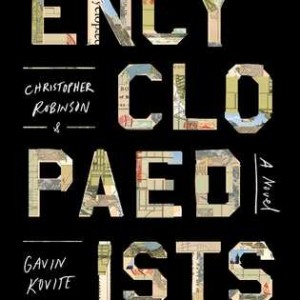Five Masterpieces of Bureaucratic Malaise
A Tax Day Reading List for the sad and despairing
The empty, interstitial spaces of immigration limbo; the antiquated artifacts of state “technology”; the absurdist hoops of functionary ringmasters; the deep, existential horror of one’s fate swept up in financial ruin… So what if you didn’t manage to file your taxes on time, there are worse things. Here are five books you should read that problematize and satirize the bureaucratic horror of the season.
Little Dorrit, Charles Dickens
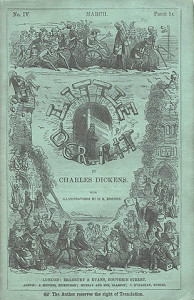
“The Circumlocution Office was (as everybody knows without being told) the most important Department under government. No public business of any kind could possibly be done at any time, without the acquiescence of the Circumlocution office. Its finger was in the largest public pie, and in the smallest public tart. It was equally impossible to do the plainest right and to undo the plainest wrong, without the express authority of the Circumlocution Office. If another Gunpowder Plot had been discovered half an hour before the lighting of the match, nobody would have been justified in saving the parliament until there had been half a score of boards, half a bushel of minutes, several sacks of official memoranda, and a family-vault-full of ungrammatical correspondence, on the part of the Circumlocution Office.”
“We admit that Mr Dickens has a mission, but it is to make the world grin, not to recreate and rehabilitate society… It is the cultus [sic] of the middle class to purchase Dickens; but an Act of Parliment would fail to enforce the serious reading of Little Dorrit.” –The Saturday Review (1857)
Americanah, Chimamanda Ngozi Adichie

“Ranyinudo, who had a cousin in America, applied for a visa but was rejected at the embassy by a black American who she said had a cold and was more interested in blowing her nose than in looking at her documents. Sister Ibinabo started the Student Visa Miracle Vigil on Fridays, a gathering of young people, each one holding out an enveloped with a visa application form, on which Sister Ibinabo laid a hand of blessing. One girl, already in her final year at the University of Ife, got an American visa the first time she tried, and gave a tearful, excited testimony in church. ‘Even if I have to start from the beginning in America, at least I know when I will graduate,’ she said.”
“Adichie is adept at describing her characters’ descent in dignity for the gambit of upward mobility. Obinze’s attempt in England is cursed. In one of the book’s most affecting scenes, he’s captured and deported, or, as his lawyer’s form states, “removed” like an object… beyond race, the book is about the immigrant’s quest: self-invention, which is the American subject. “Americanah” is unique among the booming canon of immigrant literature of the last generation… Its ultimate concern isn’t the challenge of becoming American or the hyphenation that requires, but the challenge of going back home.” –The Washington Post
The Mezzanine, Nicholson Baker
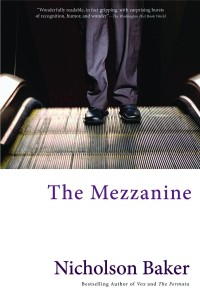
“When I drew close to the up escalator, I involuntarily transferred my paperback and CVS bag to my left hand, so that I could take the handrail with my right, according to habit. The bag made a little paper-rattling sound, and when I looked down at it, I discovered that I was unable for a second to remember what was inside, my recollection snagged on the stapled receipt. But of course that was one of the principal reasons you needed little bags, I thought: they kept your purchases private, while signaling to the world that you led a busy, rich life, full of pressing errands run. Earlier that lunch hour, I had visited a Papa Gino’s, a chain I rarely ate at, to buy a half-pint of milk to go along with a cookie I had bought unexpectedly from a failing franchise, attracted by the notion of spending a few minutes in the plaza in front of my building eating a dessert I should have outgrown and reading my paperback. I paid for the carton of milk, and then the girl (her name tag said “Donna”) hesitated, sensing that some component of the transaction was missing: she said, “Do you want a straw?” I hesitated in turn—did I?”
“The Mezzanine is as sure-footed an exploration of late-capitalist office life as The Pale King, but what manifests as ballooning boredom in Wallace’s IRS agents is everted into a fascination with the microscopic in Baker’s cubicle drone… Baker concerns himself with the preservation of “antiquated” tools of communication, such as card catalogs.” –LA Review of Books
The Utopia of Rules, David Graeber
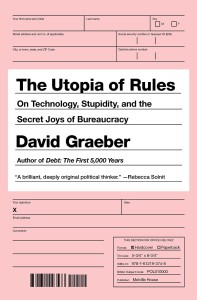
“We no longer like to think about bureaucracy, yet it informs every aspect of our existence. It’s as if, as a planetary civilization, we have decided to clap our hands over our ears and start humming whenever the topic comes up… The social movements of the sixties were, on the whole, left-wing in inspiration, but they were also rebellions against bureaucracy, or, to put it more accurately, rebellions against the bureaucratic mindset, against the soul-destroying conformity of the postwar welfare states.”
“Utopia of Rules, then, sets about convincing readers that the world is quite different from how they normally see it, and that there’s an urgent need for change. If the first venture sounds academic and the second suffused with radical politics, you’re getting a sense of the book… while Utopia of Rules stays accessible to the general public, it’s still a book where Baudrillard and bell hooks make appearances; a book that discusses things like “the very grounds of political being” and the need for “general theory of interpretative labor.” That ideological stance underlies Utopia of Rules‘s political project: to wake the left from its slumber and remind it of its anti-bureaucratic origins, and to explore how (or if) people can upend governments without erecting more labyrinthine structures in their place. That project is itself serpentine. Graeber takes us on tours through the history of philosophy, meditations on etymology and linguistics, and digressions into topics like fantasy novels and science-fiction films, all of which are extended enough to make you wonder whether he’s packed enough bread crumbs to get us back to the trail. Full credit to Graeber, though: When he eventually gets to a point, it’s almost always insightful, thought-provoking and, as befits the roundabout way he got there, unexpected.” –NPR
The Hole We're In, Gabrielle Zevin
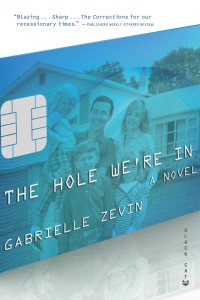
“It took Vincent nearly a month to get around to calling the credit card company, and then another two weeks for him to receive copies of all the statements, including the address to which all the bills were being sent.
That address as familiar, of course.
Vincent called the credit card company again. “There’s been a mistake, he said. “This is my parents’ credit card, not mine.”
But the credit card company insisted that there had not been a mistake. The primary card member was Vincent Pomeroy.
“But I am telling you, this is their address, not mine! I’ve never even lived in Texas!”
The credit card company told Vincent to stop raising his voice, then courteously offered to start sending the statements to Vincent’s address in New York.
“That’s not what I want! I want this, this blemish, removed from my record! I want this transferred to the responsible parties!”
The credit card company said that it was not – pause, pause, pause – unfeeling to Vincent’s situation, and then it said a phrase that Vincent had never before heard: identity theft. If Mr. Pomeroy thought he had been a victim of identity theft, the only thing to do was take the appropriate parties to court.”
“In many ways, The Hole We’re In is a bit like watching the slowest train wreck imaginable. From the first page we sense the family’s impending doom, and we read on simply to discover which straw will break their backs. We watch because we cannot look away, and, although we might hate to admit it, because we revel in their failures… The Hole We’re In is nothing short of a referendum on religion, continually challenging the boundaries of blind faith by revealing faith’s shortcomings. It is a case study of how one family becomes ensnared in the world’s trap without ever realizing it. Yet pitying the Pomeroys is like pitying the rats that risk electric shock for the cheese they will never reach. All we can do is shake our heads and ask, ‘Will they ever learn a thing?'” –Bookslut



















